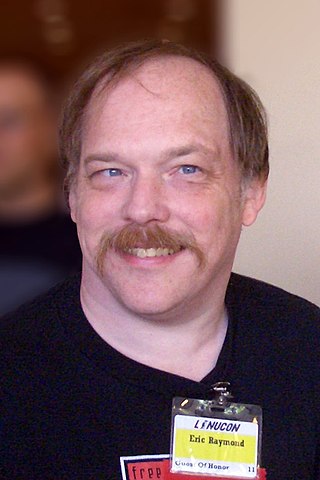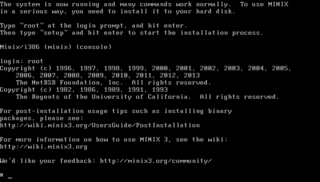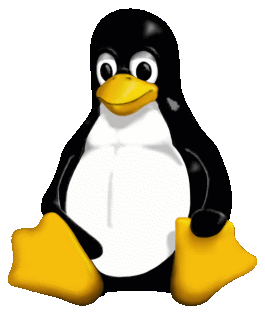
Andrew Stuart Tanenbaum, sometimes referred to by the handle ast, is an American-Dutch computer scientist and professor emeritus of computer science at the Vrije Universiteit Amsterdam in the Netherlands.

Eric Steven Raymond, often referred to as ESR, is an American software developer, open-source software advocate, and author of the 1997 essay and 1999 book The Cathedral and the Bazaar. He wrote a guidebook for the Roguelike game NetHack. In the 1990s, he edited and updated the Jargon File, published as The New Hacker's Dictionary.

Linus Benedict Torvalds is a Finnish software engineer who is the creator and, historically, the lead developer of the Linux kernel, used by Linux distributions and other operating systems such as Android. He also created the distributed version control system Git.

MINIX is a Unix-like operating system based on a microkernel architecture. Since version 2.0, it has been Portable Operating System Interface (POSIX) compliant.

Revolution OS is a 2001 documentary film that traces the twenty-year history of GNU, Linux, open source, and the free software movement.

The GNU Project is a free software, mass collaboration project announced by Richard Stallman on September 27, 1983. Its goal is to give computer users freedom and control in their use of their computers and computing devices by collaboratively developing and publishing software that gives everyone the rights to freely run the software, copy and distribute it, study it, and modify it. GNU software grants these rights in its license.
The Linux Kongress was an annual conference of Linux developers from around the world, that took place every year from 1994 to 2010. It started as a two-day conference in 1994, when Linux was in the early stages of development, and by 2003 had become a four-day event. It occurred every year in Germany except 2001 and 2007. During its lifespan, Linux-Kongress was one of the three major international grass-roots Linux and Open Source conferences in the world, along with linux.conf.au and Ottawa Linux Symposium.

The Alexis de Tocqueville Institution (AdTI) was a Washington, D.C. based think tank.

LinuxWorld Conference and Expo was a conference and trade show that focused on open source and Linux solutions in the information technology sector. It ran from 1998 to 2009, in venues around the world.

Walnut Creek CDROM Inc. was an early provider of freeware, shareware, and free software on CD-ROMs. The company was founded in by Bob Bruce in Walnut Creek, California, in August 1991. It was one of the first commercial distributors of free software on CD-ROMs. The company produced hundreds of titles on CD-ROMs, and ran the busiest FTP site on the Internet, ftp.cdrom.com, for many years.
A Unix architecture is a computer operating system system architecture that embodies the Unix philosophy. It may adhere to standards such as the Single UNIX Specification (SUS) or similar POSIX IEEE standard. No single published standard describes all Unix architecture computer operating systems — this is in part a legacy of the Unix wars.

MicroEMACS is a small, portable Emacs-like text editor originally written by Dave Conroy in 1985, and further developed by Daniel M. Lawrence (1958–2010) and was maintained by him. MicroEMACS has been ported to many operating systems, including CP/M, MS-DOS, Microsoft Windows, VMS, Atari ST, AmigaOS, OS-9, NEXTSTEP, and various Unix-like operating systems.

The Tanenbaum–Torvalds debate was a written debate between Andrew S. Tanenbaum and Linus Torvalds, regarding the Linux kernel and kernel architecture in general. Tanenbaum, the creator of Minix, began the debate in 1992 on the Usenet discussion group comp.os.minix, arguing that microkernels are superior to monolithic kernels and therefore Linux was, even in 1992, obsolete. The debate has sometimes been considered a flame war.

Linux is a family of open-source Unix-like operating systems based on the Linux kernel, an operating system kernel first released on September 17, 1991, by Linus Torvalds. Linux is typically packaged as a Linux distribution, which includes the kernel and supporting system software and libraries, many of which are provided by the GNU Project. Many Linux distributions use the word "Linux" in their name, but the Free Software Foundation uses the name "GNU/Linux" to emphasize the importance of GNU software, causing some controversy.

The criticism of Linux focuses on issues concerning use of operating systems which use the Linux kernel.

In the 1950s and 1960s, computer operating software and compilers were delivered as a part of hardware purchases without separate fees. At the time, source code, the human-readable form of software, was generally distributed with the software providing the ability to fix bugs or add new functions. Universities were early adopters of computing technology. Many of the modifications developed by universities were openly shared, in keeping with the academic principles of sharing knowledge, and organizations sprung up to facilitate sharing. As large-scale operating systems matured, fewer organizations allowed modifications to the operating software, and eventually such operating systems were closed to modification. However, utilities and other added-function applications are still shared and new organizations have been formed to promote the sharing of software.
Linux began in 1991 as a personal project by Finnish student Linus Torvalds: to create a new free operating system kernel. The resulting Linux kernel has been marked by constant growth throughout its history. Since the initial release of its source code in 1991, it has grown from a small number of C files under a license prohibiting commercial distribution to the 4.15 version in 2018 with more than 23.3 million lines of source code, not counting comments, under the GNU General Public License v2.

Tux is a penguin character and the official brand character of the Linux kernel. Originally created as an entry to a Linux logo competition, Tux is the most commonly used icon for Linux, although different Linux distributions depict Tux in various styles. The character is used in many other Linux programs and as a general symbol of Linux.
Mark Bolzern is one of the original pioneers of both the Internet, and of the Linux computer operating system. Bolzern was the founder of early Linux-specific community portals such as LinuxNews, LinuxMall, LinuxPro, LinuxGuru and PenguinPower. Bolzern was also the creator of the original plush Tux mascot, based on the original drawing by Larry Ewing. His work at LinuxMall allowed Bolzern to directly affect the Linux community with LinuxMall's support of various Linux events. His achievements play a significant role in the story of the book Rebel Code by author Glyn Moody
The History of the Berkeley Software Distribution begins in the 1970s.














